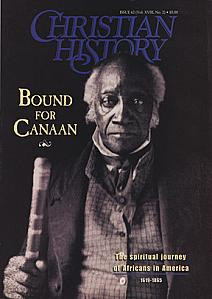RICHARD CAIN: FROM STEAMBOAT DECK TO PULPIT AND PODIUM
AFTER RICHARD HARVEY CAIN DIED on this day, 18 January 1887, eulogies and tributes poured in. “Death has robbed this denomination of its richest gem in the person of our deceased brother, whose influence is felt like a mantle of love from rice swamps of the south to the bleak coasts of New England,” observed B. W. Derrick, a leader of the African Methodist Episcopal Church (AME). He pointed out that through the labors and influence of Cain upwards of one hundred thousand souls had been gathered into the AME throughout South Carolina.
A resolution by two Baptists and a Methodist noted, “He was chaste in thought and word, and was a living epistle seen and read of all men.” The American Baptist wrote, “To the young men of our race and especially to the young men of the church whose Bishop he was, he has left a priceless legacy.”
Cain was born in Virginia in 1825. His parents were free, an African-American father and Cherokee mother. They moved to Ohio when Cain was six. As a teenager, he worked on a steamboat. He converted to Christianity in 1841 when he was sixteen. Immediately he became a soul-winner although he stayed with the steamboat crew for three more years.
Then he joined the AME, soon becoming a pastor although he had little formal education. Recognizing his need for more knowledge, he enrolled in Wilberforce College, where he studied for a year. When the Civil War broke out, he attempted to volunteer, but was rejected as were many African Americans. Following the war, the AME sent him as a missionary to freedmen in Charleston, South Carolina.
In South Carolina he labored tirelessly to build the AME, founding many new churches in the countryside, while at the same time growing the Charleston church. Under his leadership it numbered two thousand members. Meanwhile he also became politically active, helping to found the South Carolina’s Republican party. He would serve on the state’s Constitutional Convention, in its senate, and as a United States congressman. He founded and edited a Republican newspaper which did not hesitate to blast Republican corruption. He was ever an advocate of equal male suffrage and civil rights and was prominent in his advocacy of land reform in conjunction with the South Carolina Land Commission. His most famous saying was from a speech in Congress: “All that we ask is equal laws, equal legislation, and equal rights”
In 1880, Cain was elected a bishop of the AME, the fourteenth man to have served in that capacity. Given responsibility for Louisiana and Texas, he continued his zealous labors. Among his accomplishments was to found Paul Quinn College in Waco, Texas, which he served as president until 1884.
He was sixty-two when he died in Washington, DC.
—Dan Graves
----- ----- -----
For more on the African experience in the United States, consult Christian History #62, Bound for Canaan






